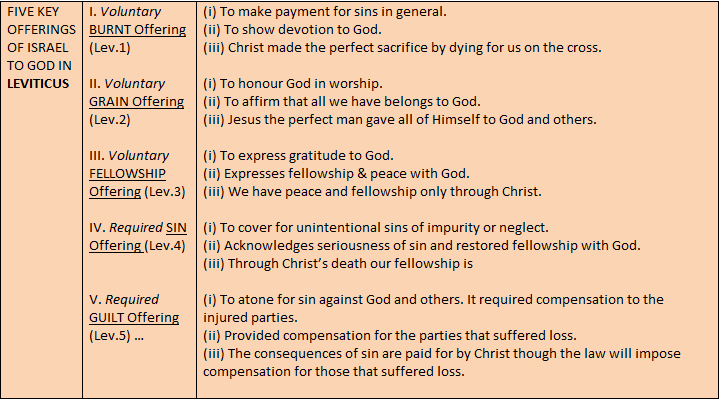Leviticus 1:1-17
Q.1. What was a burnt offering? Who was to make it? What made the offering effective? What was the part played by the priests? – (Lev.1:1-9)
Everything in the burnt offering was given to God and consumed – … the priest shall offer up in smoke all of it on the altar … (Lev.1:9 & 13). The priest could only keep the hide of the slain animal (c.f. Lev.7:8). It was an offering made by individual Israelites given on a voluntary basis (Lev.1:2). To be acceptable and effective – he shall offer it a male without defect (Lev.1:3). The person offering the sacrifice – shall lay his hand on the head of the burnt offering that it may be accepted for him to make atonement on his behalf (Lev.1:4). The offeror had to slay the animal and cut it in pieces while the priests made the fire on the altar, sprinkled blood around it, cleansed and placed the meat on the altar – an offering by fire of a soothing aroma to the Lord (Lev.1:5-9). Burnt offerings preceded the giving of the law, and were made by Noah after the Flood, by Abraham with the ram after offering his son Isaac, and by Israel on Mount Sinai (c.f. Gen.8:20; 22:2 & 13; Exo.20:24; 24:5-6). So, Israel was familiar with the idea of expressing thankfulness to God.
Q.2. How were different animals offered? What made a burnt offering acceptable to God? Why were these sacrifices made? – (Lev.1:10-17)
The difference between offering a bull, a ram, or pigeon was the huge difference in their value. It meant that all people, regardless of how much they owned, could show their devotion to the Lord (Lev.1:2, 10, 14). Offerings had to be perfect in order to be acceptable as a portrayal of the offering of our Saviour (c.f. 1 Pet.1:18-19). The sacrifices were essentially offered the same way, with the priests sprinkling the blood around the altar and burning the animals offered (Lev.1:10-17). There was a place where the ashes and feathers were placed for later removal from the outer sanctuary (Lev.1:16). All the sacrifices had the potential for making atonement for the penitent sinner and for bringing a soothing aroma to the Lord (Lev.1:3-4, 9, 13, 17).


